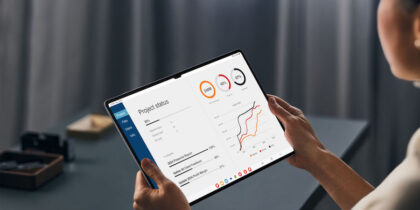Although bring your own device (BYOD) programs have clear merits, they can also be fraught with security risks and device management issues. This is readily apparent in light of a recent survey that found that one-fifth of IT professionals said their company suffered a mobile data breach. Fortunately, there are mobile device management (MDM) solutions for the BYOD environment.
For a mobile-first enterprise, issuing corporate-liable mobile devices with strong hardware-level security or implementing a choose your own device (CYOD) approach with an effective MDM solution in place are the best strategies. The right security policies and software can take the misery out of IT management and ensure there’s no lapse in productivity.
A Growing Threat
According to the Blancco Technology Group’s survey of 800 cybersecurity professionals, one in five organizations experienced a mobile security breach, primarily the result of malware and malicious Wi-Fi connections.
The survey indicated how much of a burden this can place on IT teams — such threats ate up 35 percent of IT resources and 27 percent of help desk time, according to the survey participants. In all, mobile security threats are an increasing challenge for companies that make use of BYOD, and a recent study by Kensington found that IT teams increasingly feel overwhelmed by employee errors and the need to serve as a perpetual firefighting force.
Key Security Strategies
Given the nature of the threats, an effective security solution is critical for businesses, particularly if they have BYOD policies in place. The Samsung Knox platform, which built into the latest Samsung Galaxy smartphones and tablets, offers hardware-level security. For additional security, the Knox Workspace containerization solution can be purchased to fully separate work and personal data.
Knox also offers integration with several of the best-known MDM solutions on the market, and supports the companies that participate in the Android for Work program by offering enhanced security, such as containerization, on Galaxy devices. There’s no need to choose between Android for Work and Knox, as they integrate well with one another.
Additionally, Knox connects with Google Mobile Services to allow a Google Play profile in Knox Workspace. This capability gives IT administrators control over the list of apps that users can download from the Google Play Store to ensure that no malicious applications are downloaded accidentally, giving employees the ability to install applications on their devices without compromising the enhanced security features of Samsung Knox.
The risk of doing business without a mobile security offering is too great to ignore, especially when vulnerabilities continue to grow in complexity and frequency. The right security setup can ensure that your data and overall infrastructure are secure, while offering employees the freedom to select devices from the Samsung Galaxy family.
Learn more about how Samsung mobile devices can help you provide the security and efficiency your business needs by visiting our Enterprise Solutions page.





